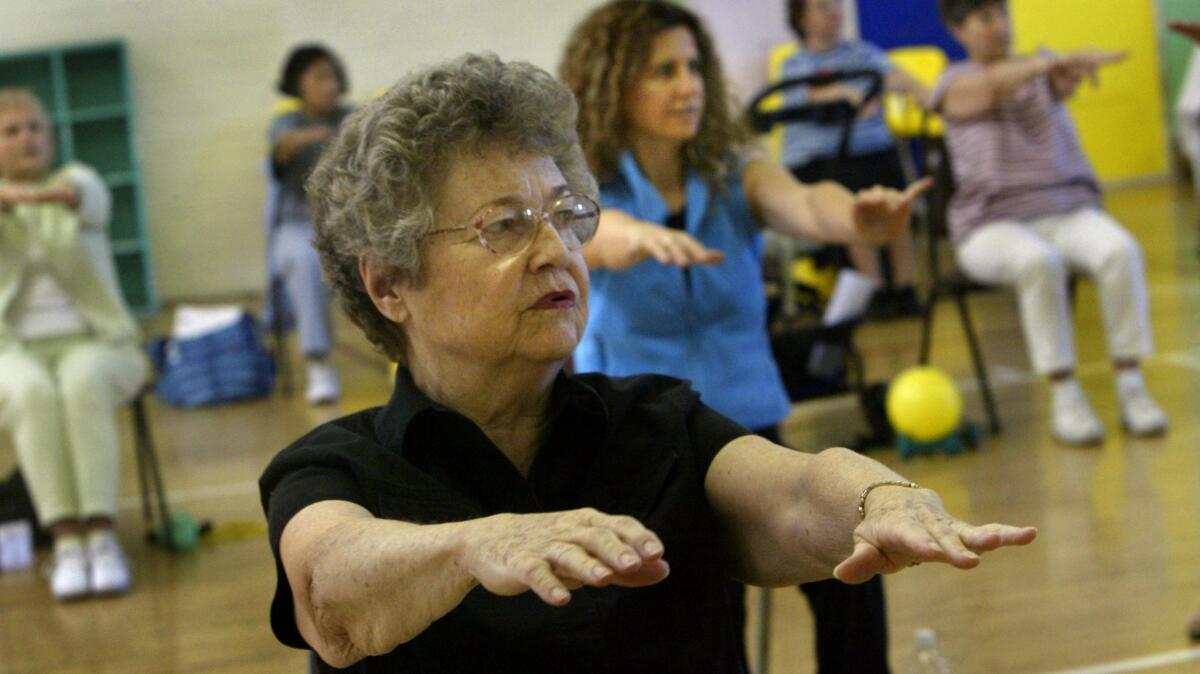To preserve mental acuity into old age, experts suggest focusing on these three things

Preventing the diseases we fear most as we age is rarely a sure or simple matter. But for those determined to slow mental decline and drive down the likelihood of developing dementia, researchers have reached a rare consensus around a trio of straightforward strategies: Engage your brain (but choose wisely), control high blood pressure (and start doing so early), and exercise regularly (just do it, already).
In scientific terms, the findings of a panel established by the National Academies of Science, Engineering and Medicine are not an unqualified rave. The committee’s experts concluded Thursday that these three types of interventions are “supported by encouraging but inconclusive evidence.”
As a result, they stopped short of endorsing a public health campaign built around these behaviors.
Still, the panel said, “the public should have access to this information to inform choices on how to invest time and resources to maintain brain health with aging.”
In drawing its qualified conclusions, the panel cited research released last summer suggesting that a program of highly targeted brain-training reduced the risk of cognitive decline or dementia by nearly half over 10 years. It cited a wide range of findings that link dementia to conditions — such as hypertension, diabetes and stroke — in which the health of blood vessels large and small is compromised. And it touted a welter of research that has linked sedentary lifestyles to a wide range of ills, and higher levels of physical fitness with better physical, cognitive and mental health.
The problem, the panel acknowledged, is not a lack of sensible and persuasive research on the cognitive benefits of exercise, mental stimulation and lifelong blood-vessel maintenance. For each of these broad strategies, there’s plenty of evidence that points to its general cognitive benefits (and often, to very specific ones).
But the panel stopped short of bestowing a gold star for scientific certainty, because slowing age-related decline, delaying mild cognitive impairment and preventing full-blown Alzheimer’s disease are related — yet not identical — challenges, and none of the beneficial strategies has been found effective in doing all of the above.

Smoking and diabetes have been linked to Alzheimer’s disease. (May 19, 2017) (Sign up for our free video newsletter here http://bit.ly/2n6VKPR)
Still, there’s good reason to believe that, for the nation as well as for individuals, improvements in one area — say, reducing age-related cognitive decline with regular exercise — will move the needle on overall cognitive health.
The committee also complained that for each of these strategies, there’s just a dearth of the kind of scientific evidence it prizes most: findings provided by carefully controlled clinical trials.
Plenty of observational studies bear out the benefits of regular physical activity on an aging population’s cognitive health, for instance. And similar studies suggest that dementia rates rise and fall in tandem with a population’s blood pressure and overall vascular health.
But the panel wanted to see more clear findings based on studies that pit a specific intervention against a sham therapy, with subjects randomly assigned to one or the other. When it comes to testing the effects of exercise or mental engagement, for instance, such trials are costly, time-consuming and, increasingly, ethically problematic to implement.
After all, given all we know about the benefits of controlling hypertension, who could justify assigning someone with high blood pressure to a group that gets no treatment? And how much more do we need to know about the dangers of a sedentary lifestyle to recommend getting off the couch and taking a walk every day?
Sometimes, the committee suggested, the demand for clinical-trial proof of an intervention’s benefits simply belabors the obvious.
Even where clinical trial findings exist — on the benefit of specific brain games to stave off age-related cognitive problems — the report finds plenty of unanswered questions.
First, the panel warned that consumers are being bombarded with products that make bold but largely untested claims for improving cognition. There is scant evidence that many of the skills honed by those games result in broad improvements in cognition, much less over long periods of time. You might do just as well by filling in a crossword puzzle or catching a Zumba class.
The panel relied heavily on results from the 2016 ACTIVE trial, a 10-year study that divided 2,802 cognitively healthy seniors into four groups. Two groups got classroom sessions aimed at improving either their reasoning or their memory skills, and a third group got a brain-training program designed to improve visual processing speed, which declines with age. The fourth group served as a control, with no training at all. Compared with members of the control group, subjects who attended the most brain-training sessions, and got booster sessions as well, saw their risk of cognitive decline or dementia reduced by nearly half over the next 10 years.
But the panel suggested that the trial’s complex design might not have taken into account the incidental effects of social engagement — a factor thought to protect against cognitive decline — that came with the brain-training activities. And it noted that, in any case, the ACTIVE trial “cannot be used to draw conclusions on the cognitive benefits” of other brain games that sharpen different skills or go about doing so differently.
One point made by the National Academies report is a bit less obvious: The physical groundwork for dementia, and even for less drastic levels of mental decline, are likely laid years — and possibly decades — before symptoms of cognitive difficulty become evident.
That fact, increasingly borne out in research, underscores the importance of lifelong habits in delaying or preventing cognitive decline and dementia. The best studies of blood pressure and dementia, for instance, suggest that people who manage their hypertension in their mid-30s see a benefit well into old age.
But dementia’s long gestation also means that researchers will need to test interventions for cognitive diseases in younger and younger subjects. That will require identifying people at higher risk of developing cognitive problems as they age and ensuring their participation in clinical trials.
And, because it will take decades for many of these trials to yield conclusive results, young people intent on improving their long-term cognitive health will have to act on recommendations that aren’t yet grounded in unshakable science.
ALSO
‘I’m 55, I’m healthy and I’m articulate’ – and have Alzheimer’s disease
Is this normal forgetfulness or should I be worried about Alzheimer’s?
One sister faces early onset Alzheimer’s. The other plans to be with her for the journey
The surprising link between air pollution and Alzheimer’s disease







